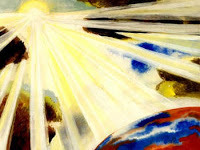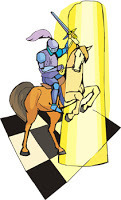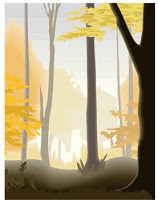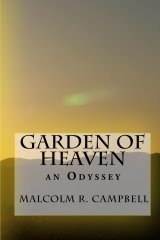Malcolm R. Campbell's Blog, page 245
October 15, 2010
The Two Years My Muse got Drunk in Hawai'i
There was a war on.
 In October 1968, when my ship reached Pearl Harbor we were listening to Donovan's "Universal Soldier" on a large reel-to-reel tape deck in the USS Ranger's Public Affairs Office on the 03 level because it pissed off the chiefs and first class petty officers walking down the passageway to nearby berthing areas and the hatch to the flight deck.
In October 1968, when my ship reached Pearl Harbor we were listening to Donovan's "Universal Soldier" on a large reel-to-reel tape deck in the USS Ranger's Public Affairs Office on the 03 level because it pissed off the chiefs and first class petty officers walking down the passageway to nearby berthing areas and the hatch to the flight deck.
Typical for a carrier on a Western Pacific cruise, we spent most of the time between our home port in Alameda, California and Pearl Harbor at General Quarters preparing for the necessary Operational Readiness Inspection.
That night, while I was leaning against a skid of bombs stowed outside the hatch to my birthing area, my muse whispered, "I am out of here. I'm heading to one of those nasty bars on Hotel Street for a case or two of booze. Don't try to find me."
"Why?"
"These bombs, for one thing."
"What about them?"
"Do you ever wonder whose names are on them?"
"I do."
"And that doesn't give you pause?"
"Yes. But unlike you, I can't avoid military service unless I run to Sweden or Canada."
"You should have run. Now you can't. Now you're here, wearing dungarees, a denim work shirt, and a round hat. So, you're off to Yankee Station. By then, it will be too late for the names on these bombs. I won't be part of it. See you around, loser."
I don't know how muses move. Perhaps they astral travel from place to place. Perhaps they transport like Captain Kirk did when he left his starship. Maybe it's all smoke and mirrors and they exist in a quantum state, entangled with whoever or whatever catches their fancy. How she left doesn't matter. What matters is the hint of jasmine from her old-fashioned L'Air du Temps perfume that hung in the air in the bomb assembly area.
Busy installing fins, boosters and lugs on each bomb, the men of G Division were oblivious to the jasmine. The scent was exceptionally strong near the long-handled, two-wheeled, yellow bobsleds of MK82s waiting for an elevator ride to the flight deck. She must have lingered there watching me, possibly trying to erase the names she could see on the bombs, names invisible to me, possibly inscribing a prayer for the not-yet dead or even a curse that might cause the bomb to end up being ditched at sea.
In spite of the shouting and clattering frenzy of the of the assembly area, I felt alone in some silent place where writers who have lost their voices are consigned for the duration. The duration referred to a multitude of eons, eras, periods, epochs and ages slated to end when...the Vietnam War was over...the USS Ranger returned to Alameda the following spring...the people of Sweden sent me a one-way plane ticket to Goteburg...or when the now muse-less writer came to his senses.
Suffice it to say, I was without a muse for many months, a year, actually, having--as people said--joined the Navy to let the world see me, in the Gulf of Tonkin, on the Star Ferry to Kowloon, on the beach at Kailua, in the shadow of the Great Buddha of Kamakura and on the mess decks, hanger deck, flight deck and other assorted compartments and spaces of the ship while the officers on the bridge wrote "steaming as before" in the deck log.
In one post, there is neither the time nor the space to record how many bottles of Scotch my muse consumed in Hawai'i' for "the duration" any more than there's time and space to record how many Kirin and San Miguel beers I consumed in various liberty reports. I have said all I want to say about that, in a fictionalized way, in my novel Garden of Heaven.
It goes without saying that I didn't declare myself as a conscientious objector just to get my muse back. That, my fellow writers, was the least of my concerns. I was concerned about the bombs and the names and whether just being there on that ship made me into a co-conspirator of the war. Perhaps my muse sat on my shoulder while I wrote out my formal application for the chain of command. She refuses to tell me.
I finally left the Navy in October of 1970. My friends told me that's when I woke up and smelled the coffee. True enough. I remember the day I was handed my discharge papers and informed that short of a nuclear war, I would never be allowed in the Navy again. Up to that moment, I had been on my own recognizance, a Journalist Third Class Petty Officer with plenty of grit but no muse.
On that chilly October day, puffy white clouds rushed eastward across the blue sky with the incoming front and, as the afternoon wore on, there was a noticeable hint of jasmine in the air.
--Malcolm
You May Also Like
Writer's Notebook: Your Novel's Setting
Xanga: 2,617 Tweets and What Do You Get
On Kindle, my magical coming of age novel: The Sun Singer
 In October 1968, when my ship reached Pearl Harbor we were listening to Donovan's "Universal Soldier" on a large reel-to-reel tape deck in the USS Ranger's Public Affairs Office on the 03 level because it pissed off the chiefs and first class petty officers walking down the passageway to nearby berthing areas and the hatch to the flight deck.
In October 1968, when my ship reached Pearl Harbor we were listening to Donovan's "Universal Soldier" on a large reel-to-reel tape deck in the USS Ranger's Public Affairs Office on the 03 level because it pissed off the chiefs and first class petty officers walking down the passageway to nearby berthing areas and the hatch to the flight deck.Typical for a carrier on a Western Pacific cruise, we spent most of the time between our home port in Alameda, California and Pearl Harbor at General Quarters preparing for the necessary Operational Readiness Inspection.
That night, while I was leaning against a skid of bombs stowed outside the hatch to my birthing area, my muse whispered, "I am out of here. I'm heading to one of those nasty bars on Hotel Street for a case or two of booze. Don't try to find me."
"Why?"
"These bombs, for one thing."
"What about them?"
"Do you ever wonder whose names are on them?"
"I do."
"And that doesn't give you pause?"
"Yes. But unlike you, I can't avoid military service unless I run to Sweden or Canada."
"You should have run. Now you can't. Now you're here, wearing dungarees, a denim work shirt, and a round hat. So, you're off to Yankee Station. By then, it will be too late for the names on these bombs. I won't be part of it. See you around, loser."
I don't know how muses move. Perhaps they astral travel from place to place. Perhaps they transport like Captain Kirk did when he left his starship. Maybe it's all smoke and mirrors and they exist in a quantum state, entangled with whoever or whatever catches their fancy. How she left doesn't matter. What matters is the hint of jasmine from her old-fashioned L'Air du Temps perfume that hung in the air in the bomb assembly area.
Busy installing fins, boosters and lugs on each bomb, the men of G Division were oblivious to the jasmine. The scent was exceptionally strong near the long-handled, two-wheeled, yellow bobsleds of MK82s waiting for an elevator ride to the flight deck. She must have lingered there watching me, possibly trying to erase the names she could see on the bombs, names invisible to me, possibly inscribing a prayer for the not-yet dead or even a curse that might cause the bomb to end up being ditched at sea.
In spite of the shouting and clattering frenzy of the of the assembly area, I felt alone in some silent place where writers who have lost their voices are consigned for the duration. The duration referred to a multitude of eons, eras, periods, epochs and ages slated to end when...the Vietnam War was over...the USS Ranger returned to Alameda the following spring...the people of Sweden sent me a one-way plane ticket to Goteburg...or when the now muse-less writer came to his senses.
Suffice it to say, I was without a muse for many months, a year, actually, having--as people said--joined the Navy to let the world see me, in the Gulf of Tonkin, on the Star Ferry to Kowloon, on the beach at Kailua, in the shadow of the Great Buddha of Kamakura and on the mess decks, hanger deck, flight deck and other assorted compartments and spaces of the ship while the officers on the bridge wrote "steaming as before" in the deck log.
In one post, there is neither the time nor the space to record how many bottles of Scotch my muse consumed in Hawai'i' for "the duration" any more than there's time and space to record how many Kirin and San Miguel beers I consumed in various liberty reports. I have said all I want to say about that, in a fictionalized way, in my novel Garden of Heaven.
It goes without saying that I didn't declare myself as a conscientious objector just to get my muse back. That, my fellow writers, was the least of my concerns. I was concerned about the bombs and the names and whether just being there on that ship made me into a co-conspirator of the war. Perhaps my muse sat on my shoulder while I wrote out my formal application for the chain of command. She refuses to tell me.
I finally left the Navy in October of 1970. My friends told me that's when I woke up and smelled the coffee. True enough. I remember the day I was handed my discharge papers and informed that short of a nuclear war, I would never be allowed in the Navy again. Up to that moment, I had been on my own recognizance, a Journalist Third Class Petty Officer with plenty of grit but no muse.
On that chilly October day, puffy white clouds rushed eastward across the blue sky with the incoming front and, as the afternoon wore on, there was a noticeable hint of jasmine in the air.
--Malcolm
You May Also Like
Writer's Notebook: Your Novel's Setting
Xanga: 2,617 Tweets and What Do You Get
On Kindle, my magical coming of age novel: The Sun Singer
Published on October 15, 2010 13:49
October 13, 2010
National Novel Writing Month

I know this is a dangerous move: I'm now an official participant in this year's National Novel Writing Month craziness which begins November 1st beneath a waning crescent moon.
As the moon becomes new, I'll make a fresh start on my "lunar journey" novel Sarabande. The story is a sequel to The Sun Singer, my "solar journey" novel from Vanilla Heart Publishing.
There are a lot of reasons why I am fighting with my work in progress:
I'm feeling a fair amount of burn out after seventeen years of off-and-on work on my other solar journey novel Garden of Heaven.Writing from my female protagonist's point of view (third person, restricted) is impacting the way I normally think "for" my characters. Sustaining a feminine view point is proving difficult.This has been a year of challenges and many emotional ups and downs, including the unexpected death of my wife's mother a little over a month ago.I know Sarabande's story very well, but I've kept wondering (honestly and as a form of procrastination) "do I really want to go through this again?"Perhaps NaNoWriMo will help me get the story written within a short time frame, the intention of the exercise being to write quickly without the kind of editing and pondering that can get a story mired in real and figurative swamps.
At the end of the month, I may have a rough block of stone out of which I can finally sculpt a living story.
--Malcolm
Published on October 13, 2010 12:22
October 10, 2010
The Danger of Writer's Critique Groups
Anyone who has been in a properly run therapy group understands that members are not sitting within the sacred circle to impose their views of right and wrong on the experiences and dreams shared by other members. To do so would stifle the speaker's search for his or her truth as well as the best means of communicating it.
It is my nature to distrust writers critique groups because the frame of reference from which those in the group may view each writing sample they see is the world of "shoulds" and "oughts" of daily conversation. While it may be fun converse over the backyard fence about the probable insanity of the mayor or the stupidity of those who made the latest popular movie, such opinions are just as detrimental to the writer and his/her work in progress as judgemental comments in a therapy setting.
I do not intend to put an overly dramatic spin on the art and craft of a writer and his/her muse bringing something new (the story, novel, or poem) into existence. However, the process, like alchemy, is that of birth or rebirth. It must proceed forward without unnatural interruptions (i.e. judgemental comments) or the work may be stillborn.
In "Garden of Heaven," my novel about the spiritual journey of protagonist David Ward, the alchemical dictum that "By fire is nature renewed whole" (Igne Natura Renovatur Integra)is one of my primary themes. Whether one is creating himself or creating a work of art (or doing both simultaneously) putting out the fire of passion and renewal stops everything.
It is difficult for me to find any separation between an alchemist and the material on which s/he works; likewise, I see little separation between a writer and what s/he writes. Dream and dreamer are one, so to speak. Neither is fulfilled or renewed unless the passions involved are allowed to naturally burn themselves out.
One doesn't even have to be an arrogant know-it-all to innocently extinguish the fire of creation within a fellow writer by innocently saying, "I really think your protagonist needs to be a man instead of a woman" or "No realistic person would react to the stress of a death in the family the way your main character reacts."
The objective truth or falsity of such statements is irrelevant within the context of a creation (writer + work) underway. In fact, the statements aren't (or don't belong) within the same sacred space as the act of creation. They don't compute.
Even a well-made soufflé will fall if it's disturbed while it's cooking in the oven. Likewise, a novel, story or poem. Staying with my alchemical theme here, you may have heard it said that the philosopher's stone is made in hell. Or, in one kind of fiery oven or another. That's how all that doesn't belong is burnt away.
In the world of a critique group, those who know how therapy works might actually be able to facilitate the process. Personally, I don't trust this to happen, so I never show my work to anyone until I consider it done (except for the editing process). This is my idiosyncratic view of going to others for help in creating something: you've heard the expression "too many cooks spoil the broth."
That's the danger, I think, of offering up one's work in progress for discussion too soon--that is, before it's complete.
--Malcolm
It is my nature to distrust writers critique groups because the frame of reference from which those in the group may view each writing sample they see is the world of "shoulds" and "oughts" of daily conversation. While it may be fun converse over the backyard fence about the probable insanity of the mayor or the stupidity of those who made the latest popular movie, such opinions are just as detrimental to the writer and his/her work in progress as judgemental comments in a therapy setting.
I do not intend to put an overly dramatic spin on the art and craft of a writer and his/her muse bringing something new (the story, novel, or poem) into existence. However, the process, like alchemy, is that of birth or rebirth. It must proceed forward without unnatural interruptions (i.e. judgemental comments) or the work may be stillborn.
In "Garden of Heaven," my novel about the spiritual journey of protagonist David Ward, the alchemical dictum that "By fire is nature renewed whole" (Igne Natura Renovatur Integra)is one of my primary themes. Whether one is creating himself or creating a work of art (or doing both simultaneously) putting out the fire of passion and renewal stops everything.
It is difficult for me to find any separation between an alchemist and the material on which s/he works; likewise, I see little separation between a writer and what s/he writes. Dream and dreamer are one, so to speak. Neither is fulfilled or renewed unless the passions involved are allowed to naturally burn themselves out.
One doesn't even have to be an arrogant know-it-all to innocently extinguish the fire of creation within a fellow writer by innocently saying, "I really think your protagonist needs to be a man instead of a woman" or "No realistic person would react to the stress of a death in the family the way your main character reacts."
The objective truth or falsity of such statements is irrelevant within the context of a creation (writer + work) underway. In fact, the statements aren't (or don't belong) within the same sacred space as the act of creation. They don't compute.
Even a well-made soufflé will fall if it's disturbed while it's cooking in the oven. Likewise, a novel, story or poem. Staying with my alchemical theme here, you may have heard it said that the philosopher's stone is made in hell. Or, in one kind of fiery oven or another. That's how all that doesn't belong is burnt away.
In the world of a critique group, those who know how therapy works might actually be able to facilitate the process. Personally, I don't trust this to happen, so I never show my work to anyone until I consider it done (except for the editing process). This is my idiosyncratic view of going to others for help in creating something: you've heard the expression "too many cooks spoil the broth."
That's the danger, I think, of offering up one's work in progress for discussion too soon--that is, before it's complete.
--Malcolm
Published on October 10, 2010 19:36
October 3, 2010
Hero's Path - the inner journey
"In Ho'ala Huna, God is a word used to point to the universal and interconnected Reality that comprises ALL THAT IS." -- Lono Ho'ala Kahuna Kupua A'o
 In book and movie reviews, the plot and characters get most of the attention. While it's difficult to discuss such hero's journey films as The Matrix and Star Wars without mentioning non-ordinary reality and "the force," the outer story gets the headlines and the buzz. However, in a story about a hero on the path, that outer journey is the tip of the iceberg.
In book and movie reviews, the plot and characters get most of the attention. While it's difficult to discuss such hero's journey films as The Matrix and Star Wars without mentioning non-ordinary reality and "the force," the outer story gets the headlines and the buzz. However, in a story about a hero on the path, that outer journey is the tip of the iceberg.
Like an iceberg, the inner journey lies beneath the surface of a very deep ocean often described as the unconscious by Jungian analysts and the 90% of creation that's inaccessible to the five senses by Kabbalists..
Likewise, when I talk about my hero's journey novels The Sun Singer and Garden of Heaven: an Odyssey, I usually mention that in one, a young man named Robert Adams goes on a mission into a dangerous alternate universe, and in the other a middle-aged man named David Ward is trying to put his shattered life back together while searching for the person who's trying to ruin him.
Such descriptions are often called "elevator pitches." They are what I might say if somebody (in or out of an elevator) suddenly asked me what my novels are about. In a brief conversation, I seldom mention the inner journey at all. In part, I don't know how to mention it quickly and/or without setting down a foundation first. I'm also worried that people may step out of the elevator thinking that I write "religious books" as mainstream society views the subject.
The Sun Singer and Garden of Heaven have a very strong spiritual focus yet, in many ways, this focus remains all but hidden until the reader discovers it and experiences it. Perhaps that's as it should be. Perhaps that's the nature of fiction, the inner journey, the true meaning of the hero's path, and personal transformation.
-
You may also like a new page added to my website: Novels of Personal Transformation.
--Malcolm
 In book and movie reviews, the plot and characters get most of the attention. While it's difficult to discuss such hero's journey films as The Matrix and Star Wars without mentioning non-ordinary reality and "the force," the outer story gets the headlines and the buzz. However, in a story about a hero on the path, that outer journey is the tip of the iceberg.
In book and movie reviews, the plot and characters get most of the attention. While it's difficult to discuss such hero's journey films as The Matrix and Star Wars without mentioning non-ordinary reality and "the force," the outer story gets the headlines and the buzz. However, in a story about a hero on the path, that outer journey is the tip of the iceberg.Like an iceberg, the inner journey lies beneath the surface of a very deep ocean often described as the unconscious by Jungian analysts and the 90% of creation that's inaccessible to the five senses by Kabbalists..
Likewise, when I talk about my hero's journey novels The Sun Singer and Garden of Heaven: an Odyssey, I usually mention that in one, a young man named Robert Adams goes on a mission into a dangerous alternate universe, and in the other a middle-aged man named David Ward is trying to put his shattered life back together while searching for the person who's trying to ruin him.
Such descriptions are often called "elevator pitches." They are what I might say if somebody (in or out of an elevator) suddenly asked me what my novels are about. In a brief conversation, I seldom mention the inner journey at all. In part, I don't know how to mention it quickly and/or without setting down a foundation first. I'm also worried that people may step out of the elevator thinking that I write "religious books" as mainstream society views the subject.
The Sun Singer and Garden of Heaven have a very strong spiritual focus yet, in many ways, this focus remains all but hidden until the reader discovers it and experiences it. Perhaps that's as it should be. Perhaps that's the nature of fiction, the inner journey, the true meaning of the hero's path, and personal transformation.
-
You may also like a new page added to my website: Novels of Personal Transformation.
--Malcolm
Published on October 03, 2010 19:59
October 1, 2010
Vanilla Heart Publishing's Author's Spotlight
 My publisher posted an interview with me today on its Xanga blog. After reading through what I said, I think it's reasonably safe to post a link to it here.
My publisher posted an interview with me today on its Xanga blog. After reading through what I said, I think it's reasonably safe to post a link to it here.Here's a sample:
Vanilla Heart: Do you have any pets? If so, introduce us to them
Malcolm: My four cats are named Orange Kitty, Duncan, Katy, and Marlo. "O.K." is a poofy 15 year old orange cat. We adopted the other three several years ago. Katy, a very large calico, is my "guard kitty," for she monitors whoever or whatever dares to come in my den.
 Katy!Here's a photo of Katy posted next to the file cabinet looking down the hall toward the front door of the house.
Katy!Here's a photo of Katy posted next to the file cabinet looking down the hall toward the front door of the house.And yes, here eyes actually glow like that. I think she's probably gotten into some Kryptonite or some very strange tuna.
Have a great weekend, and thanks for stopping by.
--Malcolm
Published on October 01, 2010 19:27
September 29, 2010
How far did you walk today? Do you really want to know?
"The average moderately active person takes about 7500 steps a day. Assuming every day the person walks, an eighty year old person who began walking at one year of age, would have taken 216,262,500 steps in their lifetime. An average person, with an average stride, living to this age of 80 will walk about 108,131 miles." -- Answers.com
When we're feeling well, how casually we walk to the kitchen for a cup of coffee or out to the mailbox to see if the mail has arrived. Sometimes people doing housework say they feel like they've walked several hundred miles between dawn and dusk. Sometimes we're walking behind a lawn mower and our yards appear immense or into the high country along the Appalachian Trail where the miles are either short or long depending on the view and our level of fitness.
 When we're stuck in line at the DMV or at the polls or at a popular movie, we seem to be taking no steps at all. When we're walking with a friend and having a good conversation, we're seldom aware of the steps. On a long hike, we may get so tired, we can hardly take even one more step.
When we're stuck in line at the DMV or at the polls or at a popular movie, we seem to be taking no steps at all. When we're walking with a friend and having a good conversation, we're seldom aware of the steps. On a long hike, we may get so tired, we can hardly take even one more step.
One of the themes in the novel Dune was the ability of psychics to see the steps--figuratively speaking--a person had taken during his or her lifetime to arrive at the emotional and physical place where they were in life. The steps taken, en route to success or failure, were as clear at footprints left in a desert.
If we could see every step taken, no doubt our houses, yards and offices would appear to be covered with footprints. Our regular routes to and from the bed or the sink or the garage would look like well-worn trails. We would see steps we wanted to erase, either because they went down wrong roads or reminded us of our failures. Other steps would remind us of old friends, satisfying jobs, and pleasant events and we'd look at them fondly.
Perhaps our lives could be charted out like a FAMILY CIRCUS cartoon that showed Billy's rather convoluted paths through the neighborhood that were impacted by spur-of-the moment decisions, animals and other people and random events. I wonder if we would change anything if we could see our steps-taken-to-date like the psychics in Dune or dotted lines Bil Kean's cartoons.
Would such knowledge alter our future or would it make us look at where we are at this moment with greater appreciation? Or, maybe we would feel really tired.
--Malcolm
When we're feeling well, how casually we walk to the kitchen for a cup of coffee or out to the mailbox to see if the mail has arrived. Sometimes people doing housework say they feel like they've walked several hundred miles between dawn and dusk. Sometimes we're walking behind a lawn mower and our yards appear immense or into the high country along the Appalachian Trail where the miles are either short or long depending on the view and our level of fitness.
 When we're stuck in line at the DMV or at the polls or at a popular movie, we seem to be taking no steps at all. When we're walking with a friend and having a good conversation, we're seldom aware of the steps. On a long hike, we may get so tired, we can hardly take even one more step.
When we're stuck in line at the DMV or at the polls or at a popular movie, we seem to be taking no steps at all. When we're walking with a friend and having a good conversation, we're seldom aware of the steps. On a long hike, we may get so tired, we can hardly take even one more step.One of the themes in the novel Dune was the ability of psychics to see the steps--figuratively speaking--a person had taken during his or her lifetime to arrive at the emotional and physical place where they were in life. The steps taken, en route to success or failure, were as clear at footprints left in a desert.
If we could see every step taken, no doubt our houses, yards and offices would appear to be covered with footprints. Our regular routes to and from the bed or the sink or the garage would look like well-worn trails. We would see steps we wanted to erase, either because they went down wrong roads or reminded us of our failures. Other steps would remind us of old friends, satisfying jobs, and pleasant events and we'd look at them fondly.
Perhaps our lives could be charted out like a FAMILY CIRCUS cartoon that showed Billy's rather convoluted paths through the neighborhood that were impacted by spur-of-the moment decisions, animals and other people and random events. I wonder if we would change anything if we could see our steps-taken-to-date like the psychics in Dune or dotted lines Bil Kean's cartoons.
Would such knowledge alter our future or would it make us look at where we are at this moment with greater appreciation? Or, maybe we would feel really tired.
--Malcolm
Published on September 29, 2010 19:45
September 25, 2010
Malcolm's Book Store
 Yes, I know, I'm probably the last author on the planet to set up an online bookstore page on his website. Now I know why it took me so long: eyestrain. I have a good website provider (Homestead) with a very accommodating program (SiteBuilder). But still, 72 dpi isn't friendly for older eyes, especially after staring at boxes, dividers, HTML snippets and grids for several days.
Yes, I know, I'm probably the last author on the planet to set up an online bookstore page on his website. Now I know why it took me so long: eyestrain. I have a good website provider (Homestead) with a very accommodating program (SiteBuilder). But still, 72 dpi isn't friendly for older eyes, especially after staring at boxes, dividers, HTML snippets and grids for several days.That said, I'll digress from my tail of woe and mention that the page includes listings for the books I've written or...
Published on September 25, 2010 07:52
September 22, 2010
Changing Seasons
"There is a harmony in autumn, and a luster in its sky, which through the summer is not heard or seen, as if it could not be, as if it had not been!" -- Percy Bysshe Shelley
 In September, we celebrate nature's gifts. I will think of this tonight as autumn arrives in Georgia beneath a Harvest Moon. It's a time of falling leaves, gathered-in apples and squash, and grapes for fine wine. It's a time of crisp afternoons and chilly nights that are finally bringing us a respite from summer's heat. T...
In September, we celebrate nature's gifts. I will think of this tonight as autumn arrives in Georgia beneath a Harvest Moon. It's a time of falling leaves, gathered-in apples and squash, and grapes for fine wine. It's a time of crisp afternoons and chilly nights that are finally bringing us a respite from summer's heat. T...
 In September, we celebrate nature's gifts. I will think of this tonight as autumn arrives in Georgia beneath a Harvest Moon. It's a time of falling leaves, gathered-in apples and squash, and grapes for fine wine. It's a time of crisp afternoons and chilly nights that are finally bringing us a respite from summer's heat. T...
In September, we celebrate nature's gifts. I will think of this tonight as autumn arrives in Georgia beneath a Harvest Moon. It's a time of falling leaves, gathered-in apples and squash, and grapes for fine wine. It's a time of crisp afternoons and chilly nights that are finally bringing us a respite from summer's heat. T...
Published on September 22, 2010 12:05
September 20, 2010
BOOK SALE: 'Garden of Heaven'
Autographed copies of Garden of Heaven: an Odyssey only $18.50!
 Buy the trade paperback now for Christmas gifts at $3.55 less than Amazon's price.
Buy the trade paperback now for Christmas gifts at $3.55 less than Amazon's price.
Offer good in the continental United States.Indicate whether you want the book signed OR signed and personalized for a specific indidual.Pay via paypal to malcolm@campbelleditorial.com or by check or money order to Malcolm R. Campbell, P.O. Box N, Jefferson, Georgia 30549
"Thought provoking - five stars." -- Midwest Book Review
When nineteen-year-old...
 Buy the trade paperback now for Christmas gifts at $3.55 less than Amazon's price.
Buy the trade paperback now for Christmas gifts at $3.55 less than Amazon's price.Offer good in the continental United States.Indicate whether you want the book signed OR signed and personalized for a specific indidual.Pay via paypal to malcolm@campbelleditorial.com or by check or money order to Malcolm R. Campbell, P.O. Box N, Jefferson, Georgia 30549
"Thought provoking - five stars." -- Midwest Book Review
When nineteen-year-old...
Published on September 20, 2010 16:47
September 19, 2010
NPR Wants Just 600 Words
I'm not a fan of short fiction. But when my youngest brother sent me a link to NPR's Three-Minnute Fiction Round Five, I was lured into writing a 600-word story that begins with "Some people swore that the house was haunted" and ends with "Nothing was ever the same again after that."
I haven't sent it in yet. (The deadline is September 26.) I will, though.
I found writing the story a nice change of pace from my complex, multi-layered fiction. It was also a no-pressure task after my we were out ...
I haven't sent it in yet. (The deadline is September 26.) I will, though.
I found writing the story a nice change of pace from my complex, multi-layered fiction. It was also a no-pressure task after my we were out ...
Published on September 19, 2010 13:46



